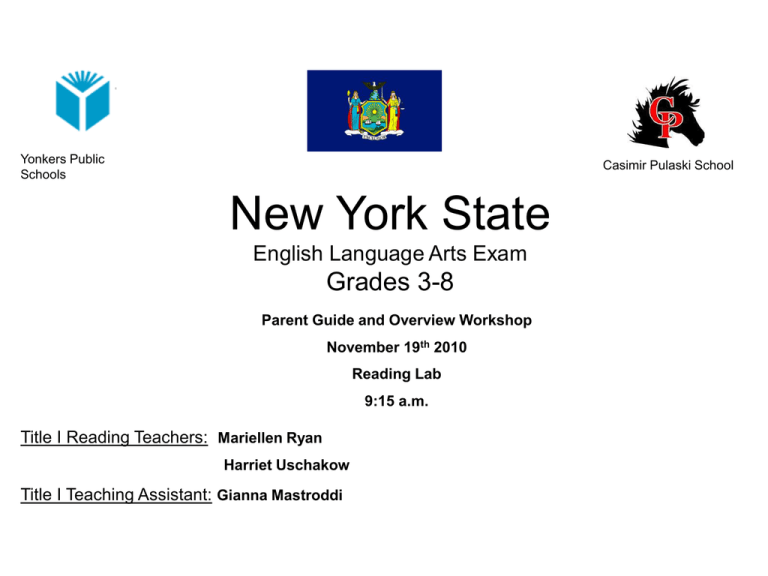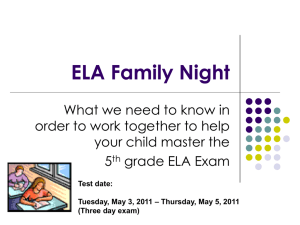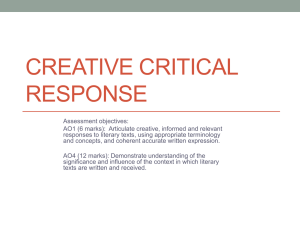New York State English Language Arts Exam Grades 3-8
advertisement

Yonkers Public Schools Casimir Pulaski School New York State English Language Arts Exam Grades 3-8 Parent Guide and Overview Workshop November 19th 2010 Reading Lab 9:15 a.m. Title I Reading Teachers: Mariellen Ryan Harriet Uschakow Title I Teaching Assistant: Gianna Mastroddi Agenda *Parents, please remember to sign in • • • • • • • • • Introductions Overview of NYS English Language Arts Exam Why test in grades 3-8 every year? What will these tests look like? How will test results be used? Preparation- How parents can help Questions & Comments Please fill out the parent evaluation form Parent Resources New York State ELA Exam The New York State tests are designed to measure how well students have mastered necessary skills and to monitor the effectiveness of instructional programs. Although testing is not the only measure of a student’s knowledge and abilities, it is a vital part of our educational process. The testing helps assess both student achievement and the progress of our schools. The purpose of the tests is to: • measure a student’s knowledge and overall achievement • measure a student’s mastery of specific skills • provide information to schools that can be used to evaluate the effectiveness of instructional programs • monitor the performance of schools and school districts for the purpose of accountability to the public Why test in grades 3-8 every year? • Initially, mandated by federal government • Also presents the opportunity to: • Evaluate the implementation of the learning standards annually • Measure student progress • Gather information about student readiness for study at the next level What will these tests look like? Grade 3 ELA Test Design Session 1 (Reading) •Format –6 to 7 passages (literary and informational) –35 multiple choice items •Standards 1, 2, 3 measured Session 2 (Listening) •Format –1 listening selection (literary) –5 multiple choice items –3 Short response items –3-5 multiple choice. •Standards 1, 2, 3 measured Session 3 (Writing) •Format -4 Short Response Questions -1 Extended Response Question What will these tests look like? Continued Grade 4 ELA Test Design Session 1 (Reading) •Format –7 to 8 passages (literary and informational) –43 multiple choice items •Standards 1, 2, 3 measured Session 2 (Listening/Writing) •Format –1 listening selection (literary) –5 Multiple Choice Questions –3 Short Response Questions --3-5 Multiple Choice (writing mechanic questions) •Standard 2 measured Session 3 (Reading/Writing) •Format –2 paired passages (literary & Informational –4 Short Response Questions –1 extended Response Question •Standard 3 measured What will these tests look like? Continued Grade 5 ELA Test Design Session 1 (Reading) •Format –6 to 7 reading passages (literary and informational) –35 multiple choice reading questions •Standards 1, 2, 3 measured Session 2 (Listening/Writing) •Format –1 listening selection (Literary) –5 multiple choice listening items –3 Short Response Questions – 3-5 Multiple Choice (writing mechanics) •Standards 1 and 3 measured Session 3 •Format –2 Paired passages -- 4 Short Response Questions –1 Extended Response •Standards 1, 2, 3 measured What will these tests look like? Continued Grade 6 ELA Test Design Session 1 (Reading) •Format –6 to 7 passages (literary and informational) –41 multiple choice items •Standards 1, 2, 3 measured Session 2 (Listening/Writing) •Format –1 listening selection (literary) –5 Multiple Choice Questions –3 Short Response Questions --3-5 Multiple Choice (writing mechanics) --2 Paired passages (literary & informational) -- 4 Short Response Questions 1 Extended Response Questions •Standard 2 measured What will these tests look like? Continued Grade 7 ELA Test Design Session 1 (Reading) •Format –6 to 7 passages (literary and informational) –41 multiple choice items •Standards 1, 2, 3 measured Session 2 (Listening/Writing) •Format –1 listening selection (literary) –5 Multiple Choice Questions –3 Short Response Questions --3-5 Multiple Choice (writing mechanics) --2 Paired passages (literary & informational) -- 4 Short Response Questions 1 Extended Response Questions •Standard 2 measured What will these tests look like? Continued Grade 8 ELA Test Design Session 1 (Reading) •Format –7 to 8 passages (literary and informational) –41 multiple choice items •Standards 1, 2, 3 measured Session 2 (Listening/Writing) •Format –1 listening selection (literary) –5 Multiple Choice Questions –3 Short Response Questions --3-5 Multiple Choice (writing mechanics) --2 Paired passages (literary & informational) -- 4 Short Response Questions 1 Extended Response Questions •Standard 2 measured How will test results be used? Achievement in Relation to the Standards •Annual feedback to schools •Standardized statewide reports •Tracking student progress Accountability •Federal and State reporting •Performance Index computed based on Grade 3-8 results •Annual measurable objectives will be revised •Discussions ongoing with USDOE regarding transition process Preparation How parents can help How Parents Can Help • Parents can play an important role in helping their children to do well in school and to prepare for these tests. Here are some things you can do Talk with your child’s teacher. • Getting to know your child’s teacher is an excellent way to stay informed about your child’s performance at school. • Attending parent-teacher conferences and school events is a good way to maintain regular communication with your child’s teacher. Be supportive throughout the year. • Make sure your child comes to school ready to learn, attends school regularly, and completes all homework assignments. • Ask your child about his or her performance in school, and be generous with praise. Encourage good work habits. • You can help your child learn good work habits at home and at school. • Explain the importance of carefully following directions, avoiding careless errors, and checking work to make sure it’s done correctly. Preparation How parents can help continued Present a positive attitude toward the tests. • Let your child know that you have confidence in his or her abilities. • Explain that some of the test questions may be difficult and that it does not matter if other students finish earlier. • Let your child know it is okay to proceed at his or her own pace. Be sure your child is physically prepared on the day of the test. • Taking a test requires a student’s full attention, so your child should have a good night’s sleep before the test. • Make sure your child has a healthy breakfast and a nutritious lunch. Parent Resources NYS Testing Brochure http://www.p12.nysed.gov/osa/ei/parentguide/parentguide.pdf Latest News on Grades 3-8 Testing http://www.emsc.nysed.gov/3-8/home.html New York State Education Department Parent Resources http://usny.nysed.gov/parents/ Office of State Assessment http://www.emsc.nysed.gov/osa Office of Curriculum and Instructional Support http://www.emsc.nysed.gov/cis/home.html Information on the Use of Calculators http://www.emsc.nysed.gov/3-8/7-8calculators.htm General Information on Testing Accommodations http://www.vesid.nysed.gov/specialed/publications/policy/testaccess/guide.htm Yonkers Department of Reading & Language http://www.ypschools.org/group_profile_view.aspx?id=409f373b-66e7-496a-a86e-de0ef7f402df Notes __________________________________ __________________________________ __________________________________ __________________________________ __________________________________ __________________________________ __________________________________ __________________________________ __________________________________










